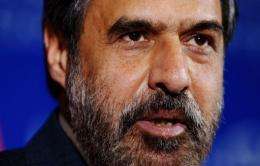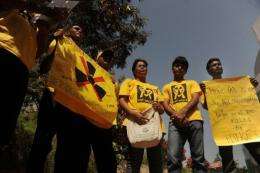India's commerce minister Anand Sharma (pictured here in Washington) has called for more cooperation with the United States on nuclear energy and brushed aside talk of scrapping ambitious plans in the wake of Japan's Fukushima crisis.
India's commerce minister has called for more cooperation with the United States on nuclear energy and brushed aside talk of scrapping ambitious plans in the wake of Japan's Fukushima crisis.
On a visit to Washington, Commerce Minister Anand Sharma said he has faced questions on whether India should rethink its nuclear energy policy and responded flatly: "My answer was no."
While supporting safety reviews of nuclear establishments, Sharma said: "We are very clear it is an absolute must in the bouquet of energy resources which have to be accessed."
"We feel that this is one area where collaboration or partnership has to be given more strength," Sharma said at the US-India Business Council.
India's fast-growing economy is heavily dependent on highly pollutant coal and imports of crude oil. Less than three percent of India's electricity comes from nuclear power but it hopes to raise the figure to 25 percent by 2050.
India, shut out of global nuclear markets for decades due to concerns over its weapons program, in 2008 signed a landmark agreement championed by US president George W. Bush that opened up nuclear trade.
France, Russia and private US and Japanese firms have since been locked in fierce competition to sell new reactors to India.
Since the crisis in Japan, environmentalists and residents have campaigned to stop construction due to start in 2013 at Jaitapur on India's west coast in Maharashtra state which would be one of the world's biggest nuclear facilities.
India's fast-growing economy is heavily dependent on highly pollutant coal and imports of crude oil. Less than three percent of India's electricity comes from nuclear power but it hopes to raise the figure to 25 percent by 2050.
The massive March 11 earthquake off Japan triggered a tsunami that battered the Fukushima facility, causing radioactive material to spew into the air, ground and sea and leading to the evacuation of 80,000 people.
The US-India nuclear deal become a symbol of growing friendship between the world's two largest democracies, whose relations were often uneasy during the Cold War.
President Barack Obama has supported warming ties with India and on a visit last year threw his support behind New Delhi's aspirations to a permanent seat on the UN Security Council. But his administration has often fended off charges in India that it has not put the same priority on relations as Bush had.
Obama's chief of staff William Daley, addressing the same forum, said: "President Obama understands the value and potential of this partnership. He sees it as one of his key priorities."
Daley appealed for India to liberalize its market further but said he was pleased with the direction of the two nations' economic relationship -- including rising Indian investment in the United States.
"I believe we are seeing the beginning of an important trend of Indian investment in the US and we obviously welcome this commitment to our economy and this relationship," he said.
(c) 2011 AFP





















